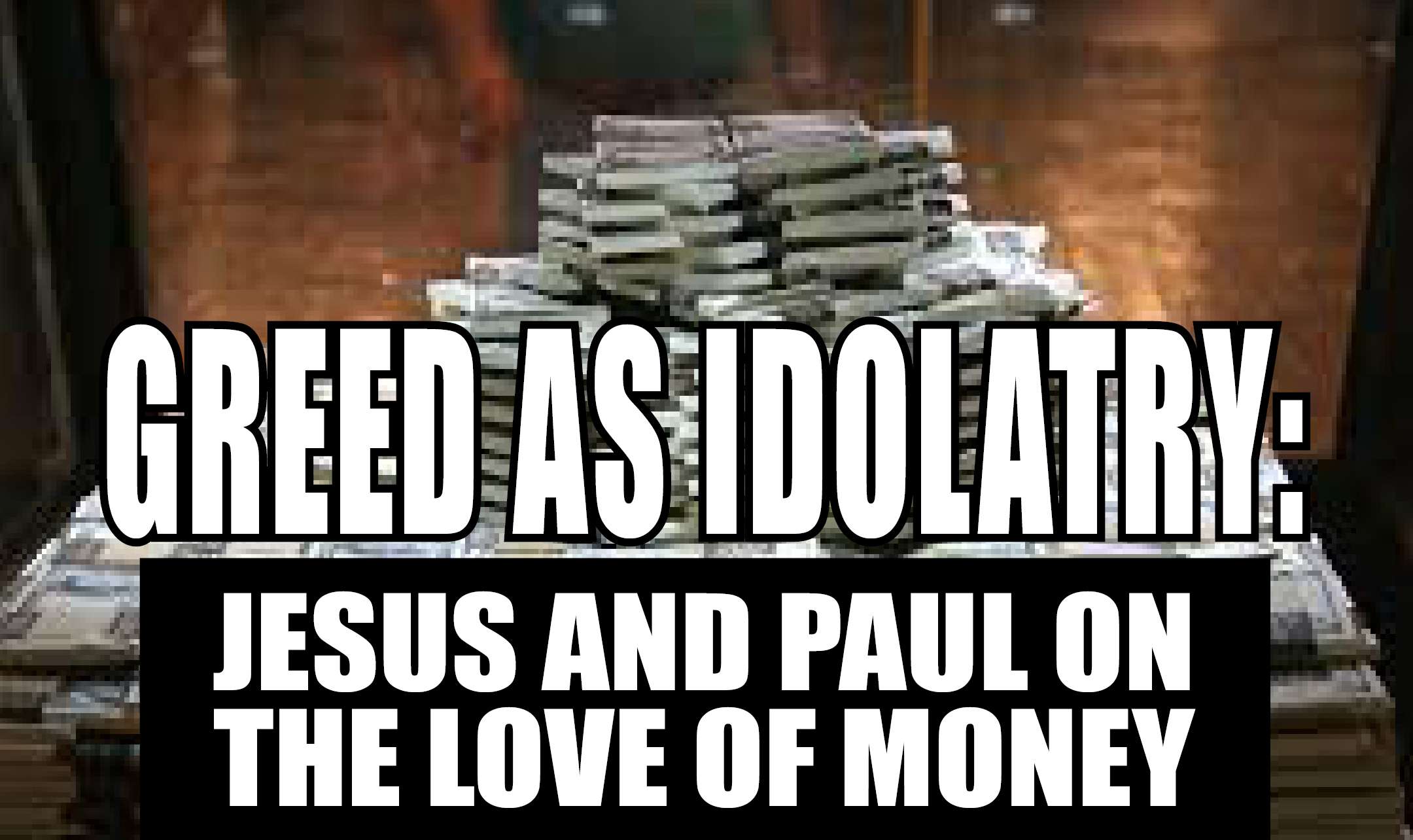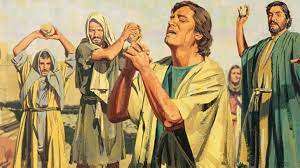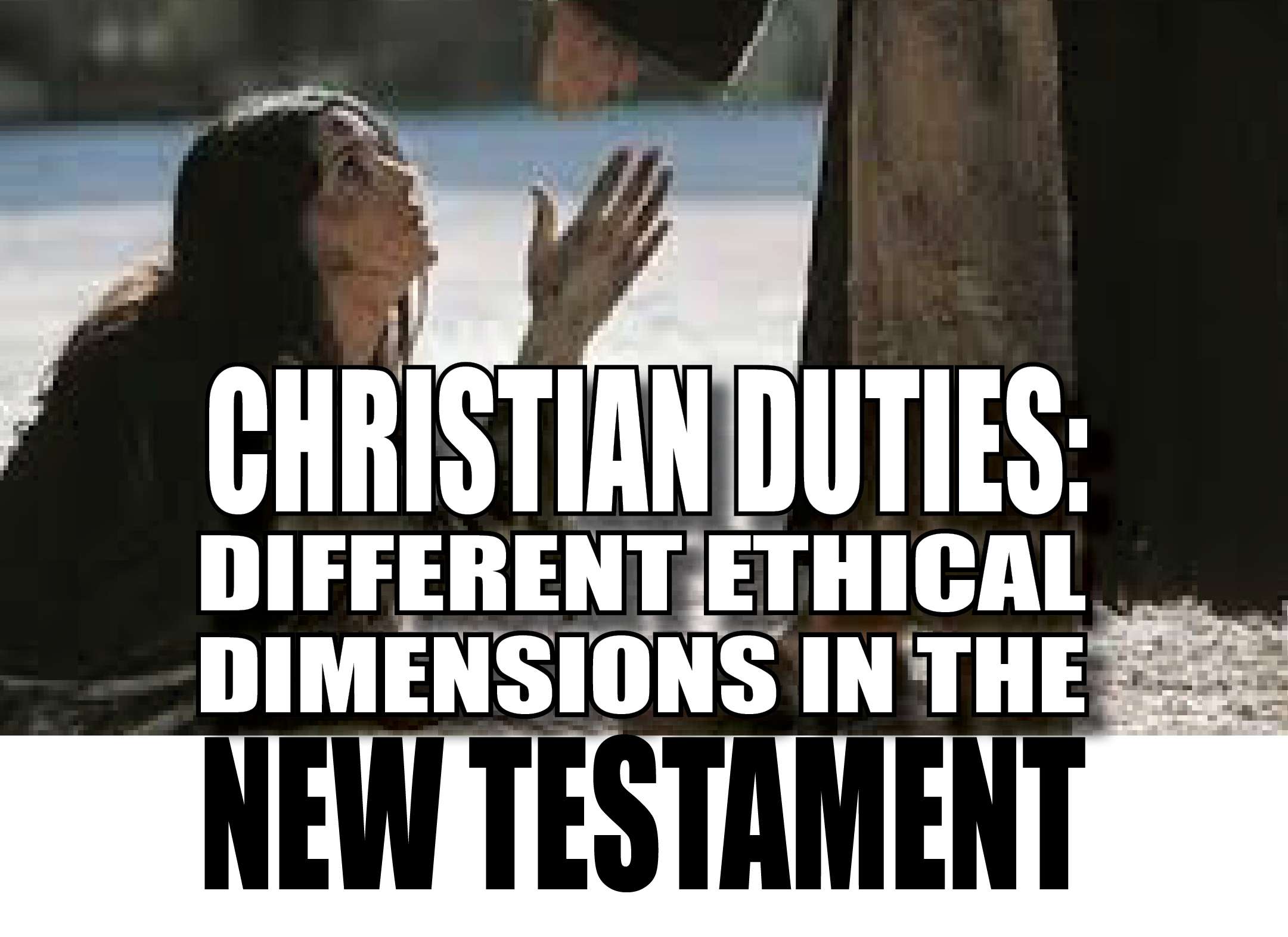

Greed as Idolatry: Jesus and Paul on the Love of Money
Pr. Ratheesh A. P.
We have reached a time when we need to live with less! India's economy is facing a lot of challenges. The value of money is going down, prices are hitting all time peak. Demonetization has badly affected all classes of our society namely farmers, small and big scale industries and the common people. The recent floods that hit Kerala not only badly affected the houses and buildings but also our wealth. Obviously, this is right time to think about how Christians should handle the money wisely. We realise that the money we trust is no more secure and we will not have abundance of money all the time.
Our spending habits have gotten out of control. We spend lavishly on clothing, cosmetics, luxurious houses and cars. On the far side we forget our obligation towards the people who are less fortunate than us. Therefore, it is necessary to think what Jesus and his disciples, particularly Paul, taught about contentment and greediness of money.
There are a few Christians who materialize spirituality. They insist that faithful christians will be blessed materially and encourage them to easy path; to obtain those blessings. Ben Witherington articulates, money is just a stuff or material good that exists in the world. If we look into the spiritual aspect of money we understand that, when God created everything in the world he did not have any regret of his work. Scripture says “God saw all that He had made, and behold, it was very good” (Gen.1:31). Therefore, all the material that he made has no evil, but human being has a capacity to turn good into bad. Therefore, the strong desire to gain more money left human beings greedy.
Cambridge Dictionary defines 'Greed' as a “strong desire to continually get more of something, especially money.” Ancient Greek philosophers also talked about greed in their ethical writings. Plutarch says a greedy person is discontent with present blessings, a discontent which leads to greed and immoderate hopes for the future. Greed for wealth is the cause of discontent. According to Aristotle, “Both one who breaks the law and one who is greedy seem to be unjust.” Thus, for him the greed is “having more,” “overreaching,” “getting more than one’s fair share.” Therefore, greed is something that we want more in order to satisfy our earthly aspirations.
Many of us don’t realize that the greed is a serious problem. We don’t consider it as a sin. R.C.H Lenski narrates an experience: “A Catholic Priest states that during his long years of service all kinds of sin and crime were confessed to him in the confessional but never the sin of Greed.” Therefore the sin of greed can replace God, any desire that replaces God is an idolatry. Idolatry is so central to biblical faith and that it is the unspeakable sin that alone arouses God’s powerful jealousy. Both Jesus and Paul vehemently criticise the person who has a strong desire for wealth in order to satisfy his self, will misplace his devotion to God, which is obviously an idolatry.
JESUS’ PERSPECTIVE ON the LOVE OF MONEY
Greed as foreign god
In the Gospel of Matthew and Luke Jesus emphatically says that to serve, love, obey and trust anything other than God is an idolatry. Matt. 6:24, Luke.16:13 says, “No one can serve two masters; for either he will hate one and love the other or he will be devoted to one and despise the other. You cannot serve God and mammon.” The image of “Master” which is used in this passage shows the religious, imperial, and social context of the Jewish and Roman Empire.To serve or be enslaved denotes relationship with God/gods (Exod 23:33; Deut 13:4; Judg 2:7) in Jewish and Greco-Roman religions. The image shows the God’s ownership and power and the worshiper’s dependence. When a person offer his whole service and devotion to gain wealth, he becomes the slave of the wealth. So he turns his dependence and obedience from God to wealth. Greed or covetousness is the trigger that forces a person to become a devotee of wealth and he becomes the idolater.
The Aramaic word 'Mamonas' means wealth, the personified word is 'Mamona' which means the force that makes people to try and become as rich as possible and the belief that this is the most important thing in life. Few nineteenth-century scholars claimed that mammon was known Syrian deity, and in some later Christian sources 'Mamonas' is depicted as the demon of wealth. Ralph Martin denotes, “To that extent greed is no better than a spirit of idolatry, the worship of mammon.” Therefore, greed is depicted here as idolatry.
Two models of idolatry can be seen in the Old Testament. First, is a Material model: Israel is often portrayed as married to God. Israel’s idolatry is often described as unfaithfulness to her husband, God. This model supports the view that sees idolatry as love and devotion. And the second is a Political model: Here God is King and the Israelites are His Subjects must depend on their King for their existence; they must be loyal. This model supports the view that sees idolatry as trust and confidence.The great reminder that comes to the Christians is that, where do we trust? Where do we put our confidence? When we trust and put our confidence in our financial security, we are already under the influence of greed and started worshiping the idols. Do I trust in anything other than God for my daily bread and future needs? What role do material possessions and money have in my life?
Greed/Wealth as a stumbling block: Parable of Rich Fool
Jesus got an opportunity to expresses his followers’ attitude towards the material possessions.There came a man from the crowd and complained to Jesus about his brother who possessed an inheritance and do not want to share with him. What we see here is that the brother who has nothing, desperately wanted his brother to share with him the inheritance. Usually we think it is the rich who crave for more wealth but often the less one has the more greedy one is. Jesus narrates a parable to answer him more clearly (Luke 12:16-21). The man in the story is not told to redistribute his goods or to share them with the poor. Nor is the man “punished in any way by God. The man’s life ends that very night not as a sign of divine punishment, but rather to make an eschatological point: we never know when our lives will end because we live only briefly and temporally. we should not be overly considered with the things of this life, but rather we should focus on the Kingdom of God. Some day we must say good bye to those things are so precious to us. A Spanish proverb says, “There are no pockets in a shroud (garment in which a dead person is wrapped for burial), we don’t carry anything with us from this earth.” But we wrongly believe that Jesus is criticizing the rich fool for being rich. On the contrary he is criticizing the rich fool for being fool! He is criticising him for being preoccupied with material possessions and neglecting the Kingdom of God. Jesus is not criticizing anyone who is preoccupied with the material matters of this world rather he is criticizing anyone who gives priority to wealth than godliness.
Jesus wanted his disciples to follow him wholeheartedly, so he insisted that they store their treasures not on the earth but in heaven (Matt.6:19-21; Luke.12:31), because one’s heart follow one’s first love. When a person invests his heart with wealth, his devotion will be placed in wealth not in God. Greed is regularly viewed as a form of idolatry (Lk.12:15; Eph.4:28; Col.3:6). Wealth and possessions tend to hinder discipleship. This doesn’t mean that poverty is moral purity, but is only as means of security for undivided obedience and loyalty to God’s reign.
PAUL’S PERSPECTIVE ON LOVE OF MONEY
Greed as idolatry
There is a sin called greed or covetousness. The Greek word 'Pleonexia' is used for greed which is one of the ugliest of sins. This word is the combination of two Greek words; the first half of the word is from pleon, which means 'more', and the second half is from echein, which means 'to have'. So Pleonexia means the desire to have more. Greek people themselves defined it as desire which cannot be satisfied, like a water bowl with a hole in it. So it is the desire to have what belongs to others. The opposite of the desire is ‘to give.’ Paul compares this desire with idolatry Col.3:5 and “the greedy person is an idolater” Eph.5:5. In this verse, Paul has used the metaphor “idol” for greed. C.F.D. Moule says, ‘idolatry is an attempt to use God for man’s purposes, rather than to give oneself to God’s service.’ The central focus of idolatry is to have more, those whose lives are dominated by the materialism in the place of God. Therefore greed is slavery imposed by the economic system. It is to show the danger of wealth that leading a person away from God. Paul also talks about people who use godliness to achieve financial gain.
Love of Money
Paul had a strong objection against the people who do the ministry for financial gain. He warns against the use of godliness for financial gain 1 Tim. 6:6-10, 2 Tim. 3:1-9; Titus 1:10-16. In these verses Paul expresses the danger of prioritizing money, says, the love of money is the root cause of all sin. A Cynic teacher denotes, “money is the mother of all evils.” The Greek writer Athanaeus quotes, ‘The belly’s pleasure is the beginning and root of all evil.’ Money is not in itself evil, but it is great responsibility. It has a power to do good and evil. So we must understand the vulnerabilities that are concealed in the love of money.
The desire for money makes people selfish (ITim.6:9,10)
In this passage Paul is referring to the false teachers who aspire to gain more money at the expense of godliness. So they make personal gain rather than God’s glory the prime object of life. The reckless pursuit of money leads a man to misplace his priorities and questionable integrity. These people think that godliness is a way of financial gain (Tim. 6:5). Even we find these categories of people today. They materialize the gospel in the name of spirituality and channelize it to earn more money. They only follow “The Profession of Christian Faith” not true holy living in the power of the spirit. They consider ministry as a profession and not a service. They use the scripture and interpret, “workman being worthy of his hire.” They use their religious profession as a means to make money. What they did was not true ministry; it was just a religious business. Many Christians today are not far from them.
Paul was always careful not to use his calling and ministry as a means of making money. In fact, he even refused support from the Corinthian Church so that no one could accuse him of greed (I Cor. 9:15-19). Too many of us know the “Price of everything and the value of nothing.” We are so glutted with luxuries that we have forgotten how to enjoy our necessities. The economic and energy crises that the world faces will probably be used by God to encourage people to simplify their lives.
The desire for love of money cause divisions (I Cor.11:18)
In the Corinthian Church there were significant conflicts between the different economic classes. This conflict becomes apparent in how the members of the church celebrated the Lord’s Supper (Love feast). It was observed by the scholars that socio-economic factors (1:26-31; 6:1-8; 8:1-11:1), are responsible for the Corinthian’s fractured fellowship. Some of the wealthier and socially superior members had been dishonouring the poor. What exactly emerged during the Lord’s Supper that led to the humiliation of the poorer members who were present.
Greed cause divisions (I Cor.11:18). Instead of treating one another with brotherly love and acting as the family of God, those who have more than enough to eat and drink at the Lord’s Supper are treating shamefully those who have insufficient quantities (I Cor.11:21-one person is hungry and another person is drunk, Those who do not have anything (11:22), whose members are humiliated by the actions of their wealthy colleagues. Jerome Neyrey argues that the division in 11:18 threaten not only the wholeness but also the holiness of the body, just as in Lev.21:16-20 the wholeness of the animal determined its holiness. So the greed for the power or identity which is gained by the money caused division in the Corinthian church. Many today are affected by this greed and gain the power and fame by the influence of money.
Jesus and Paul are strongly admonishing the people that “to flee from these things” (ITim.6:11), because it causes much grief (1 Tim. 6:10). We see the message of ‘contentment’ in the teachings of Jesus and Paul.
CONTENTMENT/GODLINESS
The Greek word 'autarkeia' is used for 'contentment' which means ‘inward self-sufficiency.’ The demand is that man should be content with the goods allotted to him by God. A person who has greed, always wanted to store more wealth. Arthur Schopenhauer says, “wealth is like sea water: the more you drink, the thirstier you become.” But a person who has Christ will find contentment always in Christ. Paul explains that godliness is indeed “great gain” (ITim.6:6, 7) in a sense. Since true godliness is characterized by contentment, he is referring to something different from the false teachers. While they are motivated by the love of money, godliness is motivated by sufficiency in God. Love of money is slavery but contentment is independence. Godliness and Independence or self-control are contrasted with ungodly desires such as greed, which leads to slavery and the manipulative use of religion to feed greed’s addictive hunger or pining. A person who is truly godly is free from or at least not enslaved to such addictions. Vincent Cheung says, ‘Christian contentment is not the elimination of all desire but it is an intensification of one’s desire toward God to a point where all other things become insignificant.’
Jesus taught his disciples to pray for their daily bread, “Give us our daily bread” which means to be content in what you have and not to be worried about the future (Luke.12:13-34; Matt 6:9-13, 19-34). Jesus says everyone who has left houses or brothers or sisters or father or mother or children or fields for my sake will receive a hundred times as much and will inherit eternal life (Matt.19:29). True godliness, the kind that does not lust after money but that exhibits profound contentment is more profitable than the love of money. A Christian can be content in various circumstances because God has strengthened his soul. Thus contentment is never a sign of weakness or resignation, but one of spiritual strength and maturity.
Today’s Christians should realize that greed the ugliest of sins can even replace God. Both Jesus and Paul strongly explain about greed as idolatry which take our trust, obedience, confidence and love from God and give to the wealth. We need to use our godliness to spread the gospel and not to use godliness to earn money. Christians should be learned to live the lives of contentment.




